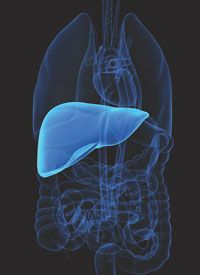AFP Level Identified as a Potential Biomarker for Survival in HCC
According to an assessment of a large global dataset reported at the 2017 International Liver Congress, log<sub>10</sub> alpha fetoprotein level in the blood directly corresponded to the years of posttreatment survival in patients with hepatocellular carcinoma.
Liver

According to an assessment of a large global dataset reported at the 2017 International Liver Congress, log10alpha fetoprotein (AFP) level in the blood directly corresponded to the years of posttreatment survival in patients with hepatocellular carcinoma (HCC)independent of the type of treatment, regional differences, and disease etiology.
The investigators suggested that AFP levels provide a straightforward and direct guidepost since an almost linear relationship between log10 AFP and survival was shown in patients with HCC that was consistent across all regions, and was irrespective of disease etiology, including Hepatitis viral infection; the presence of Hepatitis B infection did not significantly associate with AFP levels (P= .343).
On multivariable linear regression analysis, factors of HCC that directly affected AFP serum levels were the tumor size (P<.0001) and the presence of vascular invasion by the tumor (P<.0001).
“Our analysis suggested that the 2 main factors influencing serum AFP levels were tumor size and vascular invasion; in this series, etiology did not influence serum AFP levels,” commented the poster presenter Philip Broadhurst, student, School of Medicine, University of Liverpool, Liverpool, UK.
The growing body of evidence that AFP is a predictor of post-treatment OS prompted the investigators to conduct a global assessment of the relationship between log10AFP and survival using the entire range of AFP levels and omitting the use of dichotomization in order to add clarity to the issue.
Broadhurst acknowledged, “The diagnostic performance of AFP remains controversial; however, the prognostic impact of AFP is being increasingly recognized and included in staging systems, such as CLIP, and as one of the criteria for liver transplantation.” The CLIP classification is a staging system for HCC that combines Child-Pugh staging with tumor morphology, portal invasion, and AFP.
This analysis was conducted using data from 4461 patients with HCC from several regions, including 1835 patients from Europe, 1112 patients from China, and 1514 patients from Japan. The European HCC patients were recruited from Hannover, Essen, Leipzig, and Mainz, Germany, plus Liverpool, Birmingham, and Newcastle-upon-Tyne, UK. The Japanese and Chinese cohorts were from Hong Kong and Gifu, respectively.
“A strength of our study is the large number of patients included and the generalizability of the results, since patients with all disease stages and several geographic regions were included,” said Broadhurst.
Survival measurements were made from the date of diagnosis to the date of death or last follow-up using Kaplan-Meyer survival statistics.
The severity of HCC was stratified into early, intermediate, and advanced disease with patients being treated accordingly with radiofrequency ablation, resection or PEIT, TACE, and sorafenib (Nexavar), respectively.
“Furthermore, there was an equally clear discrimination in survival according to AFP level at different disease stages irrespective of region,” said Broadhurst.
Median survival for specific disease stages showed clear divisions per log10AFP levels. For example, in patients treated with sorafenib for advanced disease, the respective median survival was 15.8, 12.6, 9.8, 6.6, 5.7, and 4.0 years according to the corresponding log10AFP levels of 0-1, 1-2, 2-3, 3-4, 4-5, and greater than 5.
“Serum AFP is a readily available, sensitive and objective prognostic indicator for HCC in its own right. Individual cutoff points resulting in simple dichotomization of data waste much important clinical information,” Broadhurst concluded.
References:
- P. Broadhurst P, H. Toyoda H, Kumada T, et al. Prognostic impact of serum alpha-fetoprotein in patients with hepatocellular carcinoma: an international collaborative study. Presented at: 2017 International Liver Congress; April 19-23, 2017; Amsterdam, Netherlands. Abstract SAT-078.
Enhancing Precision in Immunotherapy: CD8 PET-Avidity in RCC
March 1st 2024In this episode of Emerging Experts, Peter Zang, MD, highlights research on baseline CD8 lymph node avidity with 89-Zr-crefmirlimab for the treatment of patients with metastatic renal cell carcinoma and response to immunotherapy.
Listen